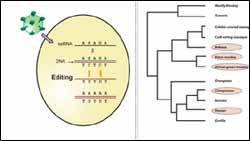HIV reveals evolution of a primate defense against intragenomic infiltrators

Antiviral editing enzymes like Apobec3G have been involved in an ancient genome defense strategy in primates <br>
Published this week on-line in PLoS Biology, Sara Sawyer, Michael Emerman, and Harmit Malik investigate the genetic roots of the battle for evolutionary advantage between HIV-type viruses and the hosts they infect. What they find is surprising.
The gene, APOBEC3G, belongs to a family of primate genes that produce enzymes (in this case, APOBEC3G) that “edit” DNA and RNA, by slipping into viral particles and inducing mutations that replace one base (cytosine) with another (uracil) as the virus undergoes reverse transcription in the host cell’s cytoplasm. The edited virus fails to replicate. HIV, in turn, generates a protein called Vif that binds to the APOBEC3G enzyme and targets it for degradation, thereby eliminating its antiviral activity.
Since the protein-binding regions that govern these interactions have a direct effect on the fitness of both virus and host, one would expect to see the proteins angling for advantage, with Vif maximizing its ability to recognize APOBEC3G and APOBEC3G doing its best to evade Vif. Such battles are thought to result in frequent mutations that alter the amino acids involved in the interaction; the perpetuation of such advantageous mutations is called positive selection.
As predicted, the APOBEC3G gene is under strong positive selection. But that selection – characterized by an analysis of twelve primates species spanning 33 million years of evolution – appears to predate the existence of HIV-type viruses. So, what has been fueling APOBEC3G’s rapid evolution?
APOBEC3G and Vif interact in T-cells, but the fact that selective pressure on APOBEC3G has been constant over the course of primate evolution suggests that another force is also acting on the gene. Sawyer et al. propose that this force is exerted by human endogenous retroviruses, which act in many ways like foreign retroviruses. These mobile genetic elements emanating from one’s own genome pose less of an immediate threat than a retrovirus like HIV. But the constant efforts of the endogenous retrovirus to “jockey for evolutionary dominance,” the authors conclude, could eventually take a toll and would be expected to provoke efforts to contain it. And it may be that this ancient intragenomic conflict endowed APOBEC3G with the means to do battle with foreign retroviruses like HIV. Therefore, despite being only recently discovered, editing of RNA and DNA may represent an ancient form of host defense in primate genomes.
Media Contact
All latest news from the category: Life Sciences and Chemistry
Articles and reports from the Life Sciences and chemistry area deal with applied and basic research into modern biology, chemistry and human medicine.
Valuable information can be found on a range of life sciences fields including bacteriology, biochemistry, bionics, bioinformatics, biophysics, biotechnology, genetics, geobotany, human biology, marine biology, microbiology, molecular biology, cellular biology, zoology, bioinorganic chemistry, microchemistry and environmental chemistry.
Newest articles

Security vulnerability in browser interface
… allows computer access via graphics card. Researchers at Graz University of Technology were successful with three different side-channel attacks on graphics cards via the WebGPU browser interface. The attacks…

A closer look at mechanochemistry
Ferdi Schüth and his team at the Max Planck Institut für Kohlenforschung in Mülheim/Germany have been studying the phenomena of mechanochemistry for several years. But what actually happens at the…

Severe Vulnerabilities Discovered in Software to Protect Internet Routing
A research team from the National Research Center for Applied Cybersecurity ATHENE led by Prof. Dr. Haya Schulmann has uncovered 18 vulnerabilities in crucial software components of Resource Public Key…





















